Green Cooling and Heating for Public Housing
Air Date: Week of February 9, 2024
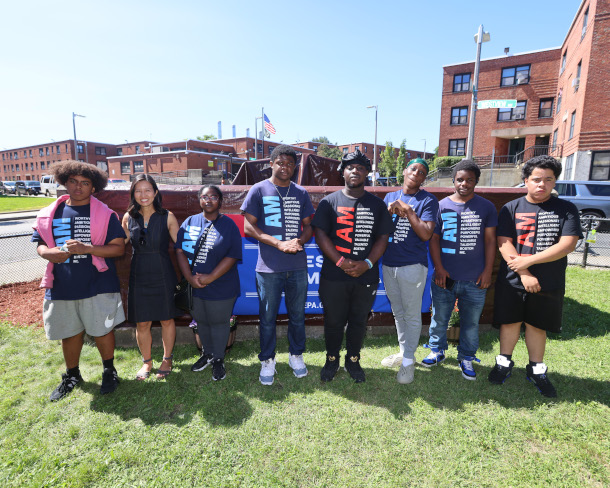
The Franklin Field Apartments in Dorchester, MA will be the first apartment complex in Boston to run on networked geothermal heat pumps. (Photo: John Wilcox, Courtesy of City of Boston Mayor’s Office)
To help address the climate crisis the city of Boston is piloting the replacement of natural gas with ground-source heat pumps in a public housing project. The technology brings fossil-free cooling and heating as well as cleaner air to historically disadvantaged tenants. Host Jenni Doering speaks with Kenzie Bok, the Administrator of the Boston Housing Authority.
Transcript
CURWOOD: From PRX and the Jennifer and Ted Stanley Studios at the University of Massachusetts Boston, this is Living on Earth. I’m Steve Curwood.
DOERING: And I’m Jenni Doering.
One of the biggest inequities when it comes to environmental injustice is the heat island effect in cities, where it can be as much as ten degrees hotter during heat waves than in nearby leafy suburbs. BIPOC people in the US tend to be concentrated in center cities, and sweltering summer heat can be especially pronounced in the concrete jungles of housing projects erected for disadvantaged people starting back in the Depression. But now, as part of an effort to decarbonize, the city of Boston is piloting ground-coupled heat pumps in public housing to cool and heat. Using a looped system of pipes filled with water or other liquid, geothermal or ground source heat pumps harvest the 50 to 60 degrees Fahrenheit warmth from down below in the winter and dump excess heat underground in the summer. That process does take some electricity, but if it’s from solar or wind, heating and cooling buildings can be entirely fossil fuel free. That’s the ultimate promise of geothermal projects like the one being piloted at Franklin Field Apartments in the city of Boston, which is led by Mayor Michelle Wu.
WU: This is a demonstration of just how much is possible when we collaborate on ambitious solutions that intersect with our greatest challenges, and when we refuse to choose between those false choices of either the climate crisis or the housing crisis, and instead realizing that they are both one and the same and interconnected.
DOERING: The Boston Housing Authority hopes to have the geothermal system up and running by the fall of 2025. Kenzie Bok is the administrator for the BHA. Welcome to Living on Earth!
BOK: Thank you so much. Thrilled to be here.
DOERING: So paint a picture for me please of what this geothermal project will actually look like. What's the vision here?
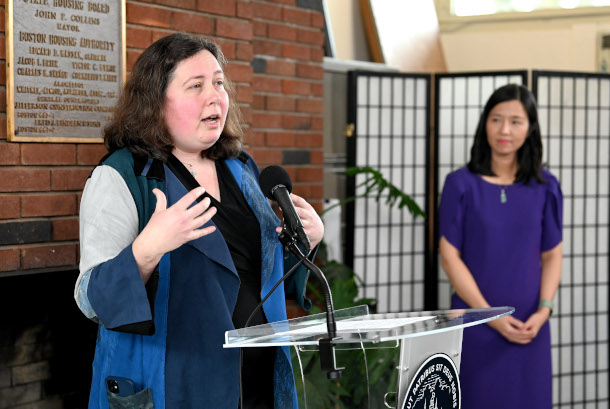
Kenzie Bok (left) is the Administrator for the Boston Housing Authority, which is partnering with National Grid to complete the project. Here she stands with Boston Mayor Michelle Wu (right) at the announcement of the project. (Photo: Isabel Leon, Courtesy of City of Boston Mayor’s Office)
BOK: We're incredibly excited about the opportunity to make a public housing development in Boston, Franklin Field, the first neighborhood in Boston to be powered by geothermal. So this is a site we have with 450 families living. This first phase is going to be 129 families. They live across seven buildings that right now are powered by a very old-fashioned central natural gas boiler system. And we were going to replace that boiler with more natural gas a few years back, that was the plan. But then Mayor Wu announced our intention, the BHA's plan, to go fossil fuel free. And we said, well, the first step to going fossil fuel free is not adding new fossil fuel infrastructure. And so we started having to come up with an alternative plan for how we're going to heat these buildings. And initially, it was air source heat pumps, and now it's actually going to be powered by the earth, with geothermal heat pumps. And it's going to mean for the first time, our public housing residents have cooling in their units in addition to heating. So it's really exciting for us.
DOERING: So you know, we're seeing hotter and hotter temperatures in the summer in Boston and around the country and around the world. So you're saying that these residents didn't have air conditioning before?
BOK: That's right. Because of the historically moderate climate, public housing is not actually required to have air conditioning in New England. And so it wasn't built into the specs of these buildings. Now, over recent years, people have often had window air conditioners in their units, but the way the units are built, you have to have a separate window air conditioner in for practically every room in order to cool it appropriately. And you know, that's really inefficient, it can be expensive to acquire those units. There's a lot of disadvantages to that approach. And we're really excited that we're going to be able to really give them state-of-the-art in-unit cooling now for the first time.
DOERING: So give me the big picture here about why you and the Boston Housing Authority are really excited about this project at Franklin Field Apartments.
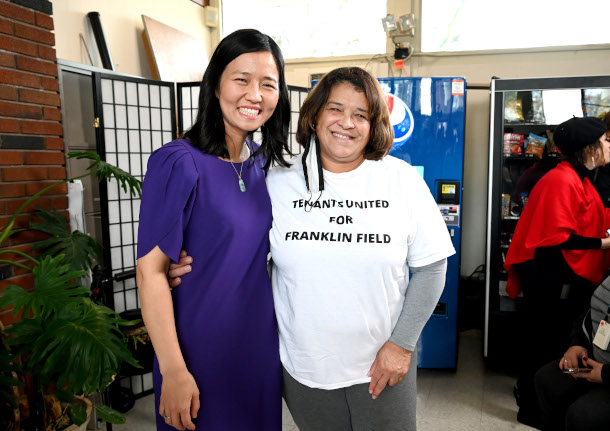
Boston Mayor Michelle Wu (left) has set a target for the Boston Housing Authority to be fossil fuel free by 2030. Here, she poses with a Franklin Field Apartment tenant (right) for a photo. (Photo: Isabel Leon, Courtesy of City of Boston Mayor’s Office)
BOK: We feel like there's hugely multilayered benefits. So we're actually doing a bunch of electrical and HVAC work as part of the project, and a critical piece is we're actually replacing the old gas stoves in the units with new electric induction stoves, and we're going to be adding mechanical ventilation. So it's both going to bring better air quality, a better experience for our residents who live in the units, it's going to bring jobs to this area. And we actually, the Housing Authority, has historic partnerships with helping to get our public housing and voucher residents into jobs like high quality jobs in the construction trades. And we see geothermal as a space where there could be a lot of those jobs. And I think that everybody wants to see us combat climate change. I mean, Franklin Field is a site where even though it's not right on the coast, it actually has repeatedly been subject to flooding because of groundwater changes. And then you've also got heat island effects in that neighborhood where the in-unit cooling can't come fast enough. So I think everybody sees climate change coming. And the question is like, what do we do with that? And how are we not fatalistic? And I think us getting to do this exciting installation right here in a public housing community, it gives everybody in our community a lot of hope, and a real sense of being at the heart and right at the frontier of that change.
DOERING: Tell me more about this goal for the Boston Housing Authority to be fossil fuel free by 2030. And can you tell me about how this project helps get Boston closer to that goal?
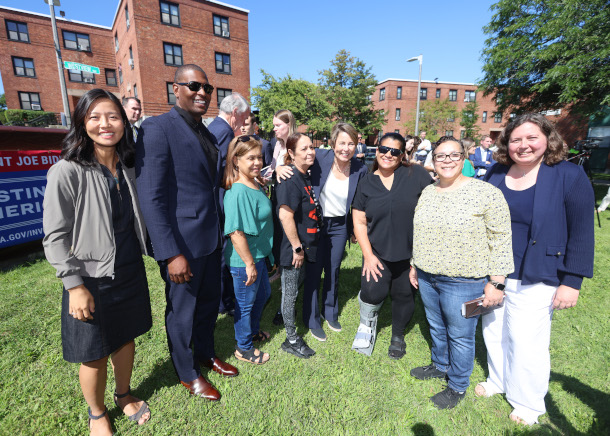
The project plans to provide heating and cooling across 7 buildings and 129 public housing units. Shown here is Mayor Michelle Wu (far left), U.S. EPA Administrator Michael Regan (next left), Massachusetts Governor Maura Healey (center), and Kenzie Bok (far right) among various tenants of the Franklin Field Apartments. (Photo: John Wilcox, Courtesy of City of Boston Mayor’s Office)
BOK: Yeah, so we're the largest landlord in Boston. We own about 10,000 units of housing. And we house many of the lowest income Bostonians, and we're really proud of that. And what we're doubly proud of is that with this fossil fuel free goal, we're really putting our public housing residents at the front of the line in the energy transition. So you know, we talk a lot about environmental justice communities, all of our public housing developments are environmental justice communities. And the reality is, is that if we weren't intentional about this, what you would see is that, because public housing has been historically disinvested in and because we have very old buildings with creaky systems, which require a lot of updating for a fossil fuel transition, they would naturally fall to the back of the line. And here, we're doing exactly the opposite. We really think it's vital that we take the energy transformation and really intertwine it with improving conditions for all our public housing residents.
DOERING: And how do you plan on involving residents of Franklin Field in this process?
BOK: Yeah, so our resident leadership at Franklin Field is amazing. It's a heavily Latino site. And so we have a lot of Latino leaders there. And they're really excited about this. And a lot of the reason that we're doing this here is hearing about some of the air quality challenges at Franklin Field and recognizing that we couldn't possibly do an energy transformation there without also tackling ventilation. We know that our residents suffer disproportionately from asthma, so they've been big advocates for that. They also are, you know, really excited about the job possibilities. They're always pushing for more opportunities for the youth at the site. And we actually have a new big youth program kicking off at Franklin Field that's been funded by Mayor Wu. And there's a workforce development component of it. So we're really interested in, can we get our young people coming in, like seeing this geothermal installation go in, and then open up pathways for them to be future workers, if that's something that excites them. So we see our residents as co-creators of their communities and environments. And so this has been something where every step along the way we've been, we've been talking to them about it.
DOERING: So talk to me a little bit more about how this project might advance environmental justice efforts, you know, here in Boston and beyond and help sort of push things forward in the country.

The project will also replace gas stoves in these public housing homes with new electric induction stoves, which aims to improve air quality and health outcomes for residents. (Photo: rhodesj, Flickr, CC BY 2.0)
BOK: We think that there are huge advantages to doing geothermal first in public housing. They're both moral and values advantages, putting the communities that have too often been hurt by environmental pollution, and all the kind of negative environmental decisions that our communities have made, putting them at the front of the line for change, for cleaner air, for more comfortable living, that just feels morally important. It's also true that a public housing authority like ours has the advantage where we own a whole bunch of buildings all together. So when you're testing out the mechanism for putting a whole neighborhood on a new source like geothermal, it's actually easier to do it with us than a neighborhood that's split up between lots of different owners. So we see that as a kind of logistical advantage to doing what we should be doing from a values perspective anyways. So we think that if we can do this here at Franklin Field, then we can partner with the utilities, with National Grid and others to do this across all of our sites. So you know, we would love to see this expand to other sites of ours. And then we think that as everybody gets kind of comfortable with this technology, it's going to expand to other neighborhoods in the city, and also everywhere else in the country. You know, we think it would be great if suddenly a bunch of utilities said, "Oh, wait, public housing, that's a great place to start with this transformation." And this sort of Boston-driven focus on putting our public housing residents first became something that was happening all over the country. We think that'd be great.
DOERING: So you've got National Grid involved in this geothermal project, but they're not going to be selling gas to residents or to the Boston Housing Authority anymore. How does that sort of change things? And why are they on board with, you know, giving up a revenue stream?
BOK: I think that for them, it's really exciting to think about a system that they could install and manage the same way that they do kind of existing fossil fuel infrastructure, and there will be a continuing revenue stream for geothermal. It will obviously look different. But I think that for the utilities, the opportunity to have a networked solution is actually more similar to what they've been doing, than some of the other alternatives. You know, there's a lot of solutions that work for one house somewhere, but they don't work for getting a whole city like Boston off of fossil fuel infrastructure. And so we actually think seeing the utilities as a partner in this, rather than as an obstacle, is really critical for us getting to that systems-level approach, and we're excited that they're willing to be that kind of partner.
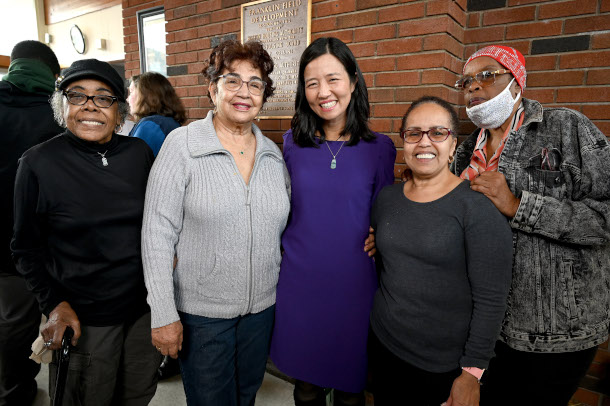
Residents of Franklin Field Apartments attended the announcement of the project in January. Here they pose for a photo with Boston Mayor Michelle Wu (center). (Photo: Isabel Leon, Courtesy of City of Boston Mayor’s Office)
DOERING: Now switching to geothermal is kind of a first step that we can take towards decarbonization in buildings. What's the next step in Franklin Field Apartments and in the Boston Housing Authority as a whole?
BOK: Yeah, so we know that to really do this well, we have to kind of change all of our systems. So in this case, you know, we're putting geothermal in, but we're also putting updated electrical and HVAC in at the same time, so that the geothermal hyperefficient system can hook up to better infrastructure inside of our buildings. We're also, as we do that additional electrical wiring, looking to ready our buildings for solar on top of the roofs, right? In the long run, I'd love to see Franklin Field actually be a net energy producer, between the geothermal in the ground and solar on the roofs. So we're getting more and more ambitious about this all the time.
DOERING: So how do you actually make this work? I mean, if you're talking about, you know, making a change that's already pretty significant, and then looking even bigger picture and saying, "Well, wait a minute, we need to make sure that the electrical system is going to maybe be able to handle solar panels someday." So how do you make this work with a limited budget?
BOK: The financial support that we're getting from both Mayor Wu at the city of Boston and from the federal government, especially some of the money that's contained within the Inflation Reduction Act, is totally crucial. So you know, there's a lot of tax credits in the Inflation Reduction Act, and for the first time, public institutions like ours are able to take advantage of them, but there's also just funding. You know, we had the EPA Administrator at this site talking about the grants that they're making available for building decarbonization. These are the Climate Pollution Reduction Grants. You know, that's the type of funding that we're going to need. And then the mayor's put really significant funds in the capital budget for the city to support us. So there's no question that this takes money. What we've noticed is that the incentive programs that do exist, both the Mass Saves program at the state and some of the federal incentives, we actually get more money to fund these projects when we go bigger, when we think more about a like holistic deep energy retrofit. So that's really the direction that we're driving things in. And, not for nothing, the world can't wait, right? The timing of climate change is such that we all need to be looking for ways to do the most ambitious projects possible, because we can't stretch this all out over multiple decades.
DOERING: Kenzie Bok is the Administrator for the Boston Housing Authority and former Boston City Councilor for District 8. Thank you so much.
BOK: Thanks so much for having me.
Links
Boston Globe | “Heating at Franklin Field in Dorchester to Be Converted to Geothermal.”
Living on Earth wants to hear from you!
Living on Earth
62 Calef Highway, Suite 212
Lee, NH 03861
Telephone: 617-287-4121
E-mail: comments@loe.org
Newsletter [Click here]
Donate to Living on Earth!
Living on Earth is an independent media program and relies entirely on contributions from listeners and institutions supporting public service. Please donate now to preserve an independent environmental voice.
NewsletterLiving on Earth offers a weekly delivery of the show's rundown to your mailbox. Sign up for our newsletter today!
 Sailors For The Sea: Be the change you want to sea.
Sailors For The Sea: Be the change you want to sea.
 The Grantham Foundation for the Protection of the Environment: Committed to protecting and improving the health of the global environment.
The Grantham Foundation for the Protection of the Environment: Committed to protecting and improving the health of the global environment.
 Contribute to Living on Earth and receive, as our gift to you, an archival print of one of Mark Seth Lender's extraordinary wildlife photographs. Follow the link to see Mark's current collection of photographs.
Contribute to Living on Earth and receive, as our gift to you, an archival print of one of Mark Seth Lender's extraordinary wildlife photographs. Follow the link to see Mark's current collection of photographs.
 Buy a signed copy of Mark Seth Lender's book Smeagull the Seagull & support Living on Earth
Buy a signed copy of Mark Seth Lender's book Smeagull the Seagull & support Living on Earth

